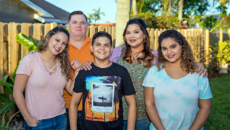“Whatever you do, don’t adopt,” insists my pushy uncle Bruce at a family holiday gathering.
“Why not?” I ask.
“Well, I heard somewhere that all adopted kids have problems,” he announces in a booming voice. My wife and I look at each other in disbelief. This is not the first time Bruce has said something insensitive. Yet for Linda and me, his comments are especially painful.
We had gone through six years of trying to start a family and several more years of infertility procedures. Now that we had finally made up our minds to adopt, here’s Uncle Bruce and his “I heard somewhere.”
In a perfect world, our immediate and extended families would be educated, sensitive, and supportive about our journeys in the world of adoption. Yet as an adoptive parent and a psychotherapist who has counseled many families about adoption issues, I am constantly amazed at the clumsy, invasive, and hurtful things that certain relatives have to say.
For example, have you ever:
- …been treated as a second-class member of your family because you were childless, or because your children were adopted?
- …had to listen to one of your relatives spout nonsense, rumors, or generalizations about “all adopted children?”
- …gotten tired of hearing, “Oh, but she looks exactly like you!” (As if it mattered.)
- …been asked, “Don’t you wish you could have a real child?” or “How could you be so stupid as to stay in touch with that irresponsible birth mother?”
- …been aghast when one or more of your relatives made insensitive or stereotypical remarks about your child’s racial features or special needs?
- …felt slighted by a grandparent who gives a little less love, money, gifts, or attention to your child who is adopted?
How does an adoptive parent or adopted child respond to family members who say and do strange things due to misinformation or discomfort about adoption? Here are the four rules that have worked for my counseling clients and in my own family encounters:
Appoint yourself ambassador of adoption.
Rather than feeling shocked or belittled each time something bizarre comes out of a relative’s mouth, see him or her as an innocent soul who lacks in basic knowledge about adoption. Your task is to teach this person what he or she needs to know in order to stop hurting or insulting you and your child.
In order to be a knowledgeable ambassador, educate yourself and your children about the best methods of explaining adoption: emphasize the positive aspects of adoption and know what to say to the nonsense certain people utter. That could mean two hours a month attending a support group of adoptive parents or taking a class on post-adoption issues at a local agency. Or it could mean reading magazine articles or books on situations you and your family are encountering or will be facing in the future.
One of my counseling clients told me recently, “I often get useful information from my catch-up phone calls with other adoptive parents. Just a half hour every couple of weeks talking with those who have kids a bit older than mine gives me a great preview of what I’ll be facing.”
“Immunize” yourself before family encounters.
How do you protect yourself and your child from certain members of your family who just don’t get it?
First, prepare before a family event to stay calm and positive. A few days or several hours before a family gathering, ask a supportive person who will be at the event with you — a longtime friend, a sibling, or some other informed relative — to be your “booster shot” if anyone says something unpleasant. Tell this person, “If anyone says or does something ridiculous, I’m going to look at you, and we’re going to make eye contact to remind each other that I’m a good parent and I’ve got an amazing kid.” Knowing ahead of time that someone understands and is rooting for you will immunize you against whatever toxic comments come your way.
At the Vista Del Mar Adoption Support Groups in West Los Angeles, adoptive parents are taught to say numerous times to their infants and toddlers, “Hey, do you know what adoption is? It’s how we became a family, and we’re so glad that we’re all together as a loving family.”
One of my counseling clients, an adoptive mother of two children, told me, “My kids and I are so comfortable with adoption because from the time they were old enough to talk, we would play this game of asking ‘Hey, do you know what adoption is…?’ Now at ages five and eleven, whenever they hear negative comments, they wonder, ‘What is wrong with this person? Doesn’t he know that adoption is a great thing? He is so out of it.’”
Do a background check on problematic relatives.
Another way to deal with the odd remarks of an opinionated relative is to uncover the hidden insecurities that underlie the strange comments. If you ask a few of your family members why a relative tends to say hurtful things, you will probably discover something very interesting.
Quite often, the most invasive or chronically advice-giving relatives are that way not because you need advice, but because they were raised by an invasive or chronically advice-giving mother or father. Or you’ll find this person to be judgmental with his or her own spouse and kids — it’s not just your kid who gets picked on. Or maybe you’ll come to understand that the relative who cannot get comfortable with your child’s racial or ethnic features is uncomfortable with her own appearance or social status.
For example, Jenny, 44, is the Caucasian parent of 12-year-old Alicia, whose Latin-American features are part of her beauty. Yet Jenny’s mother, Bernice, 64, can’t stop making negative comments about Alicia’s skin, eye, and hair color, and her ethnic pride as a Latina.
According to Jenny, “For years my mother has urged me to make Alicia look, sound, or act more ‘classy.’ What she really means is that she wants Alicia to be more ‘white.’ I want my daughter to feel connected to her extended family, yet I often feel like screaming at my mother and forbidding her to see Alicia.”
I asked Jenny to find out why her mother is so obsessed about status, race, looks, and fitting in. A few weeks later, she told me, “I spoke to my mom’s younger sister and found out something I’ve never known before. When my mother was in high school, she was in love with a Cuban immigrant whom her parents refused to let her marry.”
Jenny continued, “You would think my mother would have learned from that painful episode, but it’s just the opposite: My mom was rejected by the status-oriented cliques at her high school, and she’s always tried to make up for that painful experience by doing everything she could to look affluent, act sophisticated, and fit in socially. She probably thinks she’s trying to help by being so concerned about Alicia’s looks and whether she too will fit in.”
Even if your relatives are carrying hidden pain or shame, that doesn’t make their prejudices excusable. It simply allows you to think about their problems rather than feeling insecure about your own life.
Hold your ground firmly but with compassion.
Even though you might feel like lashing out at relatives who say or do hurtful things, you will be far more effective if you respond in a more sensible way. The next time Jenny heard Bernice say, “Why don’t you put some blonde highlights in Alicia’s hair?” her first impulse was to snap at her mom. But instead, she took a deep breath and tried out a communication technique we had practiced in a counseling session. It utilizes both firmness and compassion to let the family member know you care about him or her but you will not put up with hurtful comments about your child.
The technique consists of two reassuring statements surrounding an assertive middle one. In a calm and sincere tone, Jenny said, “Mom, I know you care about Alicia and that you want the best for her.” (This was the reassuring top layer.) “But your comments about hair color are dangerous to her self-esteem. They make it sound as though she needs to pretend to be white in order to be OK. I love you, Mom, and I want Alicia to have a good relationship with you. But if you make one more remark about her looks or her racial features, I won’t be able to let her be around that kind of harmful talk.” (That was the assertive middle part.) Jenny then concluded, “I know you can do it, Mom. You are an intelligent, considerate person and you can appreciate that my daughter, your granddaughter, is a beautiful Latina who is going to do quite well in this world.” (That was the reassuring bottom layer.)
Jenny could tell during the next few months that it wasn’t easy for her mother to get beyond her own insecurities. Bernice still gave holiday and birthday gifts of clothes and accessories that were “preppy” and not quite what Alicia or her friends like to wear. Yet Bernice did stop making hurtful comments to Alicia or to Jenny. Over time and with several one-on-one conversations, Jenny was able to teach her mother that, to some extent, times had changed.
As Jenny told me during her final session, “I don’t know if I’ve completely changed my mother from being an insecure or prejudiced person. But I’ve helped to change her comments and her behavior. And for now, that’s enough. She is supportive and positive with Alicia most of the time.”
As with many of our relatives, the expectation in Jenny’s case was not perfection or 100% compliance. A few of our relatives will still sometimes say and do things that make our hair stand on end. But if you become more adept at responding with a mixture of compassion and firmness, you and your children will survive any clumsy family moments. Without being shocked or crushed at occasional misinformed remarks, you can smile and say to yourself, “It’s all relatives.”


